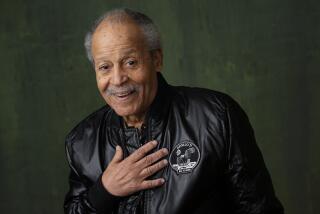Maj. Gen. John Bruce; Head of Unmanned Space Unit
- Share via
Former Maj. Gen. John Bruce Medaris, the military director of the nation’s unmanned space program who after a seemingly miraculous recovery from cancer devoted his remaining years to the Episcopal priesthood, has died of the disease, it was learned Sunday.
Medaris was 88 when he died Wednesday at his summer home in Highlands, N.C., after a long struggle against bone and lung cancer. The announcement was made by friends in Florida and reported by United Press International.
He had commanded the Army’s early space program, the Army Ballistic Missile Agency, when it orbited America’s first satellite on Jan. 31, 1958. The program was soon turned over to the civilian control of the new National Aeronautics and Space Administration.
Col. Pat Patterson of Maitland, Fla., a friend of Medaris’ for 47 years, said the former general had picked the nation’s first team of space scientists, both military and civilian, “and I have never seen a team surpass that one.”
The historic team that built those first missiles was headed by German scientist Wernher Von Braun, father of the Saturn V rocket that was to send Americans to the moon and a pioneer in the development of Germany’s wartime V-2 rocket. Kurt H. Debus, the Kennedy Space Center’s first director, was another team member.
The expatriated German scientists that included Von Braun had been sent after the war to Ft. Bliss, Tex., and later transferred to the small north Alabama cotton town of Huntsville where Medaris became their commander.
There was little sense of urgency about the nation’s embryonic space program until the Korean War broke out in 1950. Then seven years later, on Oct. 4, 1957, the Soviet Union launched the 184-pound Sputnik I, the world’s first orbiting satellite.
On Dec. 6, Medaris’ team tried to respond by sending a three-pound satellite into orbit, but the Vanguard rocket which was to have propelled it rose two feet off its Cape Canaveral launch pad and exploded into a giant fireball.
America finally got into space Jan. 31 when a Jupiter C booster hurled the 31-pound Explorer I into orbit. The satellite discovered the Van Allen Radiation Belt.
Medaris was born in Milford, Ohio, and at 16 lied about his age to get into the Marines. After a couple of years, he resigned and tried his hand at business, where he made but then lost a fortune.
Medaris entered the Army as a second lieutenant and came through 300 days of World War II combat unscathed.
An ordnance expert, he served as chief of the first Army contingent to Argentina from 1949 to 1952, and in 1955 was named commander of the Ballistic Missile Agency.
He became known as an aggressive, often arrogant commander who would roll over anyone in his way. He even carried a swagger stick for emphasis.
But in 1964, four years after retiring from the service, he was stricken with bone cancer and told he had only 18 months to live. Eighteen months later he was not only still alive, but the cancer somehow had gone into remission.
“The thought had sometimes crossed my mind that perhaps a power, or whatever it was, was keeping me intact because there was some important job that I was destined to do,” he said in a 1970 interview.
He told the Los Angeles Times in a 1982 interview from Cape Canaveral, where he had gone as an honored guest to watch the launch of the space shuttle Columbia, that he decided to repay the debt by service to his church.
He said he originally intended to become only an Episcopal deacon but “soon I found myself irresistibly forced into (other) situations.” He thus became the Very Rev. John B. Medaris, rector of Anglican churches in Maitland and Orlando, Fla.
In recent years, the International Aerospace Hall of Fame made Medaris a fellow, its highest award. The Army awarded him the first Medaris Award to Army Space Pioneers.
In the meantime, the cancer resurfaced in 1970 but again went into remission, returning only recently.
Although he had become a man of God, he did not lose the aggressiveness that had marked his military days and remained particularly critical of the decisions made many years earlier that separated military and civilian space objectives.
“It’s one of the greatest mistakes we ever made.”
More to Read
Get the L.A. Times Politics newsletter
Deeply reported insights into legislation, politics and policy from Sacramento, Washington and beyond. In your inbox twice per week.
You may occasionally receive promotional content from the Los Angeles Times.










